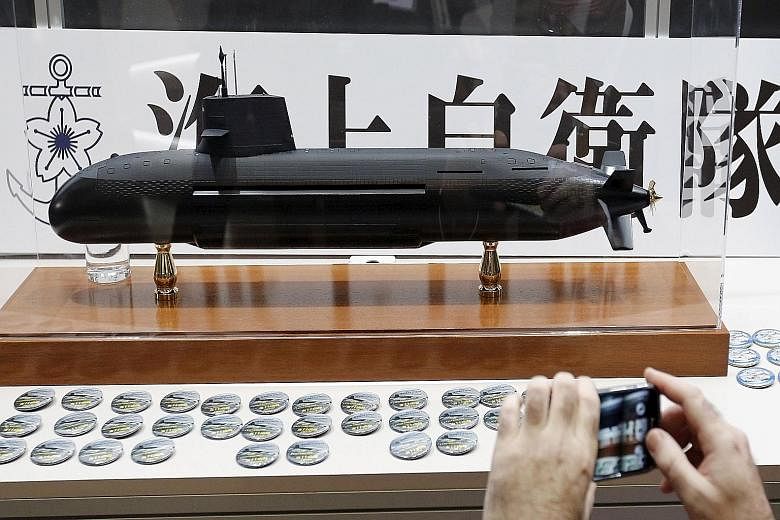YOKOHAMA • Some of Japan's biggest companies, best known for motorcycles, washing machines and laptop computers, are pitching a new line of global products: military hardware.
Quiet-running attack submarines. Amphibious search-and-rescue planes. Ship-mounted radar systems that use lasers to help pinpoint approaching enemies.
After a ban on weapons exports that the Japanese government had maintained for nearly 50 years, Mitsubishi, Kawasaki, Hitachi, Toshiba and other military contractors in this semi-pacifist country are cautiously but unmistakably telling the world they are open for business.
A maritime security exposition in May was the first military industry trade show in Japan, organisers said. And it was the first anywhere to feature Japanese manufacturers.
-
Financial aid sweetener to promote military exports
-
YOKOHAMA • To seed the market for military exports, Japan is offering financial aid to buyers.
Credit guarantees, for example, would make buying weapons from Japan more affordable for developing countries, by lowering interest rates on the loans used to finance deals.
In the past month, Japan has begun negotiating military-related trade agreements with Malaysia and the Philippines.
India has expressed interest in a large-capacity seaplane, the US-2, built for the Japanese navy by ShinMaywa Industries, a manufacturer better known for dump trucks and the passenger boarding bridges used at airports. The US-2 could help India patrol distant island chains like the Andaman and Nicobar, hundreds of kilometres from the mainland across the Indian Ocean.
Breaking into a market dominated by established giants, often with close ties to governments, will not be easy. In many areas, specialists say, Japan's best bet is probably to cooperate rather than compete head-to-head.
"We make some excellent parts and subsystems, but if we intend to produce whole systems, like next-generation fighters, it's impossible to develop these things on our own," said Mr Satoshi Morimoto, a former defence minister.
Japanese companies already sell a small number of high-tech military components to the United States, such as missile-tracking sensors used in ballistic missile defence systems, under exceptions to the export ban introduced beginning in the 1980s. Japanese companies are also important suppliers to the global civilian aircraft industry, making parts for Boeing's 787 Dreamliner passenger plane, for example.
Many here contend they could do the same for military aircraft, like the F-35 fighter jet made by Lockheed Martin.
Despite their new freedom to export, Japanese companies remain wary of being associated with a controversial industry.
"Most of the things here aren't very weapon-like," said Mr Yoshibumi Kusaka, a helicopter sales representative.
"If we suddenly started exporting in-your-face weapons, personally, I would find that difficult," he said.
NEW YORK TIMES
"I've never seen them," said Major-General Mick Fairweather, a procurement specialist with the Australian armed forces. "It's going to be a growing thing."
Prime Minister Shinzo Abe lifted the prohibition on military exports last year, part of a loosening of restrictions on Japan's military powers that were put in place after its defeat in World War II.
While much of the Japanese public opposes the changes, Mr Abe says they are long overdue.
The growing might of China - Japan's close but not always friendly neighbour - has added force to his argument. Mr Abe is counting on increased military-related trade to help cement ties with other countries in the region that share Japan's wariness of China. South-east Asian nations and India are high on the list of potential customers.
Japan hopes Australia will be a receptive market for Soryu-class submarines, built by Mitsubishi Heavy Industries and Kawasaki Shipbuilding. The subs, which cost about 50 billion yen (S$550 million), use ultra-quiet diesel-electric drives that make them hard to detect.
Mitsubishi Heavy is working on an amphibious assault vehicle, used for landing troops on hostile shores, that could eventually compete with US-designed vehicles used by the United States Marine Corps.
Many people outside the country would struggle to name a Japanese arms manufacturer. Even in Japan, the business is little publicised.
But some of the country's large industrial conglomerates have long had sidelines in military production, supplying a variety of equipment, including tanks and planes, to the Japanese military, the Self-Defence Forces. With rare exceptions, the government has been their only customer.
"When you don't fight wars, it doesn't exactly help the arms industry," said Professor Masahiro Matsumura from Momoyama Gakuin University, who specialises in politics and national security.
Less than 1 per cent of Japan's industrial output is military-related, and only four Japanese companies are among the top 100 arms producers ranked by the Stockholm International Peace Research Institute, a watchdog group. The biggest, Mitsubishi Heavy Industries, earns less than one-tenth the revenue from military sales as the top US military contractor, Lockheed Martin.
Small production runs make Japanese hardware relatively expensive, Prof Matsumura said.
And a lack of real-world experience is a hurdle. "The US fights a lot of wars, so they get feedback on the performance of their weapons," he said. "Japan doesn't fight, so there's no feedback."
Japan has not sent troops into combat since World War II, and its post-war Constitution renounces the use of force "as a means of settling international disputes".
Among the changes that Mr Abe's government is enacting are new laws that will allow the Self-Defence Forces to operate abroad in a wider array of circumstances, including to defend allies like the US.
NEW YORK TIMES

